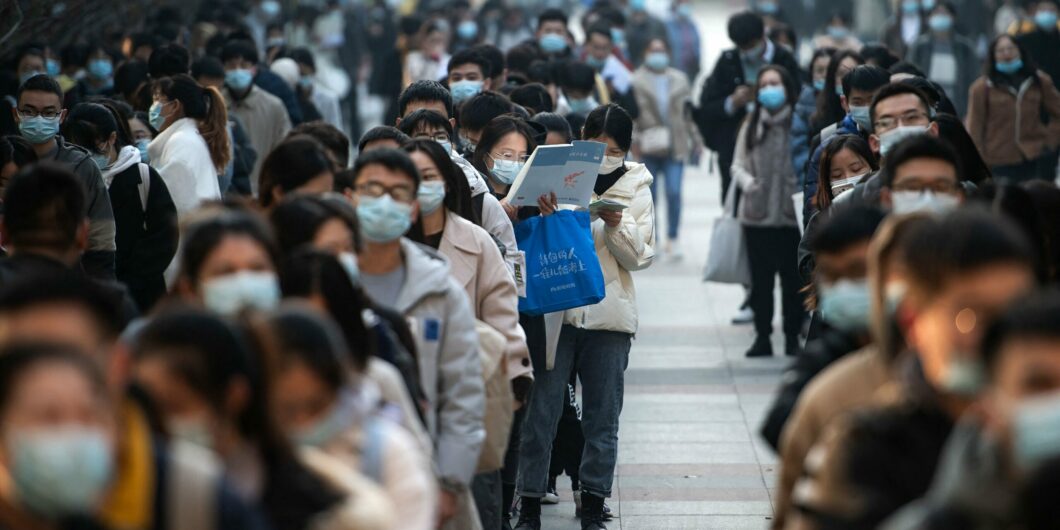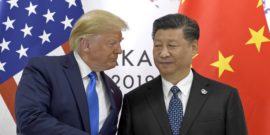The illiberalism of China and India differs markedly from the populist trends now widely studied elsewhere.
The Chinese Government’s Bitter Advice to the Unemployed
When Marx and Engels developed their theory of communism, they promised that a period of violent world revolution, followed by a “dictatorship of the proletariat” (really, a dictatorship by Communist theoreticians on the supposed behalf of the proletariat) would be followed by a long-lasting or even eternal reign of infinite prosperity, individual freedom, permanent peace, and an end to oppressive factory labor. Instead, with “administrative” supervision of the means of the production, all human beings would be free to do their own thing, as Marx forecast in The German Ideology: instead of boring factory work or other manual labor, everyone would be free to “hunt in the morning, rear cattle in the afternoon, write poetry after dinner,” and be a literary critic in the evening, according to his present inclinations, without ever being limited to a single occupation against his will.
Well, once Communist regimes were established—in the Soviet Union, China, North Korea, Vietnam, and Cuba—they did live up, in part, to Marx’s promise. The problem is that the promise was more or less achieved in such countries for only a few individuals at the top. Rulers like Stalin and his successors, Mao, the North Korean despots, and the Castro brothers lived in almost unrivaled luxury. No factory work for them!
And so wide was their freedom, it included the right to rob, torture, imprison, and execute anyone they chose, without being limited by the rule of law or any effective system of constitutional rule. Those privileges extended, to a varying extent, to the circle of apparatchiks, party functionaries who carried out their masters’ will—albeit always being aware that displeasing the master could entail the most severe punishment, for oneself and one’s family. The lot of nearly all the rest of the population in any of these countries was poverty—one reason why, prior to the fall of the Soviet regime, authorities endeavored to jam all broadcasts from the outside world, notably the Voice of America, lest the people know what they were missing. (North Korea’s despotism still does its best to prevent its subjects from having any awareness of the way their prosperous neighbors to the south are living.)
For a time after Mao’s death, it was claimed that the Chinese communist government had found a way to combine continued authoritarian rule with the opportunity of prosperity for all, owing to the partial privatization of the economy (in violation, of course, of Marx’s tenets). Thanks to this policy, initiated by party leader Deng Xiaoping, the people’s standard of living did increase exponentially, at least in major cities. (Those who became too prosperous were nonetheless subject to the awareness that their wealth, just like that of Russia’s “oligarchs,” was subject to seizure by the authorities at any time.)
Now, however, the Chinese government has expressly reneged on the promise of continued popular prosperity. Parents had typically scrimped at considerable hardship just to enable their offspring to receive an advanced education and hence professional employment. However, faced with a surfeit of millions of recent college graduates who cannot find jobs that are in any way commensurate with their training (for example, a record high of 20% unemployment among urban youth, higher among college grads), Chinese leader Xi Jinping has exhorted them to “eat bitterness” and settle for either doing manual labor in the cities or move to the countryside to take up farming.
As the New York Times observes, in a front-page article in the official People’s Daily published on Youth Day in May, Xi used the phrase “eat bitterness” five times. Xi has repeatedly exhorted Chinese youth to “seek self-inflicted hardships,” citing his own experience of being expelled to work in the countryside under Mao’s so-called “Cultural Revolution” of the 1960s. As the Times notes, the Chinese Communist Party takes the youth unemployment rate seriously, fearing that idle and restless youth could threaten its hold on power. Hence Mao’s expulsion of millions of urban youth to the countryside—with their return subsequently compelling the party to allow private employment. (For a chilling account of the horrors of the Cultural Revolution, in which two million people died for their political “sins,” while tens of millions more were hounded, ostracized, and imprisoned, see Tania Branigan’s just-published Red Memory: The Afterlife of China’s Cultural Revolution. As one commentator observes, the book “will tell you more about Xi Jinping’s rule than any tome on economics.”) The whole enterprise was a prefigurement of the subsequent terror practiced by fanatical Communist rulers in Cambodia almost a decade later, portrayed in the film The Killing Fields.
Xi Jinping is currently “waging a campaign against the country’s private economy” in order “to maintain Communist Party political control.”
But contrary to the implication of the commentator just cited, economics and politics are not so easily separated. As a Wall Street Journal editorial published the same day as the Times story reports, Xi Jinping is currently “waging a campaign against the country’s private economy” in order “to maintain Communist Party political control”: too much economic liberty might fortify demands for greater political freedom (as occurred during the bloodily suppressed Tiananmen Square protests of 1989). Xi’s campaign includes “regulatory crackdowns on tech companies that should be leading a rapid economic expansion.” Despite the dependence of Xi’s rapid military buildup on economic growth, preserving the Party’s monopoly on power always come first.
These developments must fortify Western fears that China will launch a military attack on Taiwan in order to divert its people’s attention from their domestic suffering—the time-honored stratagem of tyrants (and one currently being employed by Vladimir Putin in Ukraine). But there is a domestic lesson here for Americans as well. As Wall Street Journal columnist Joseph Sternberger observes, the immediate source of China’s economic crisis parallels the roots of America’s economic difficulties today. China responded to the Great Recession of 2009 by a policy of overstimulating its economy, encouraging “an explosion in lending via state-owned banks” and other financial entities in order to “prop up” its manufacturing sector. This led to “an era of economic overproduction,” as manufacturers were freed from the law of supply and demand. But a parallel policy has been pursued by the Biden administration, using the COVID epidemic as an excuse for piling on trillions of dollars of new Federal spending, much of it having little or no relation to the epidemic and continuing well beyond its end. The consequence we now face is rampant inflation, devaluing many people’s savings, which the Fed has attempted only haltingly to curb via a series of interest-rate hikes, which in turn discourage business investment (and ultimately threaten a rise in unemployment).
The domestic lesson here concerns the folly of believing that government can effectively “manage” an economy, whether through radical spending and debt increases, subsidies to favored industries (such as producers of electric cars, unwanted by most consumers), regulatory policies unmitigated by consideration of their economic effects, or redistributionist tax increases. Rather, a certain dose of governmental humility is in order. As the Nobel Prize-winning economist Friedrich Hayek observed, efforts at “central planning” by government (much favored by Communist regimes) inevitably fail, because no government possesses the knowledge that is dispersed among individual producers and consumers. And allowing government too much authority over our economic lives inevitably threatens our political freedom as well (witness the vast power now wielded by American teachers’ unions to block needed educational reforms such as expanded charter schools and school-choice programs—thanks to the teachers’ enormous contributions to Democratic politicians.)
As economic historian James Grant explains in his 2015 book The Forgotten Depression: 1921: The Crash that Cured Itself, the now little-remembered depression that followed the end of World War I was quickly “cured” by the policies of restraint that the Harding administration adopted: limiting government spending rather than boosting it in an effort to promote employment. By contrast, Franklin Roosevelt’s program of vastly expanded spending, taxation, and regulation did nothing to end what became the Great Depression. While Roosevelt was (thank God) no Mao or Xi, he did chafe at, and endeavored to overcome, the restraints that the Constitutional structure exercised on his authority. Let us be thankful for, and endeavor to preserve, the Constitutional order that protects us from having to “eat bitterness” at the government’s behest.


